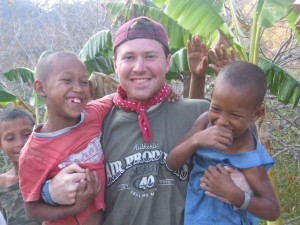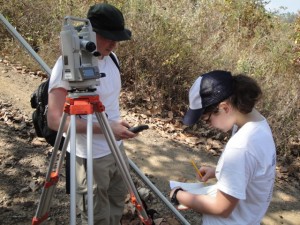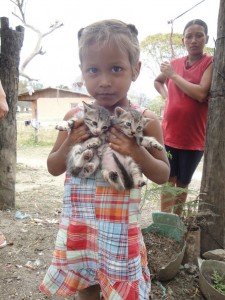 Someday soon, the residents of El Convento, Honduras, will be able to enjoy what people in the developed world take for granted: fresh clean water in their homes. Until then, they use water drawn from a polluted stream running through the village. When their village’s water distribution and filtration system is complete, it will be thanks to the planning and hard work of Lafayette’s student chapter of Engineers Without Borders (EWB).
Someday soon, the residents of El Convento, Honduras, will be able to enjoy what people in the developed world take for granted: fresh clean water in their homes. Until then, they use water drawn from a polluted stream running through the village. When their village’s water distribution and filtration system is complete, it will be thanks to the planning and hard work of Lafayette’s student chapter of Engineers Without Borders (EWB).
EWB is a multidisciplinary group of students dedicated to meeting the basic health needs of developing communities by applying sustainable and practical engineering solutions. The complex nature of the team’s work requires not only engineering expertise, but design, fundraising, team-building, public relations, and interpersonal skills. The team is comprised of students with majors from all four of the College’s academic divisions.
The current project in El Convento is one of many that EWB has undertaken in Honduras since 2003, when the chapter began establishing long-term relationships with communities in the Yoro District of the country. In El Convento, as the team has done in the neighboring villages of Lagunitas and La Fortuna, EWB is designing and building a potable water system. It consists of three water collection dams, a system of five slow sand filters to purify the water, a 6,000-gallon concrete water storage tank, and piping connecting these to each of the homes in the village.
EWB students have taken dozen of trips to Honduras, including the most recent one in August, but much of the prep work and planning takes place right on campus.
“All the things we do in Honduras are prepared for and practiced at Lafayette,” says technical team leader Diane Tran ’11 (West Hartford, Conn.), a double major in civil engineering and economics & business. “The tank foundation laid in August was designed by EWB members, and we practiced its construction during our monthly workshops. When we got to the site, the land was unlevel and vegetation had re-grown. In four days, we cleared everything out and carefully poured a concrete foundation. It was great to see the drawings turn into real life.”
EWB is planning another trip in January 2011. During the first week, a team of students, accompanied by faculty adviser Josh Smith, assistant professor of mechanical engineering, will return to La Fortuna to assess how the system they helped install from 2007-09 is working. Then, a second group of EWB students will arrive to do preliminary work for the construction of the water storage tank in El Convento. Two other trips, in March and August 2011, will include work on the slow sand filters.
 Along with the design and construction work, EWB is preparing manuals that the community will use as an owner’s guide to manage the system once it is up and running. Although EWB has taken the lead in designing the water system, the community of El Convento has established a water board, supervises the project implementation, and maintains the system when EWB members are not there.
Along with the design and construction work, EWB is preparing manuals that the community will use as an owner’s guide to manage the system once it is up and running. Although EWB has taken the lead in designing the water system, the community of El Convento has established a water board, supervises the project implementation, and maintains the system when EWB members are not there.
The trip in August was Tran’s second with EWB. “On the trip, I was the oldest member and was helping/training the new members. I realized that all this information and knowledge of the huge senior class must be passed on to the younger members so that EWB will survive. It was a good experience to see the new members at work and to see promising commitment.”
After graduation, Tran will be looking for a job in the civil engineering industry. Her long-term career goal is working for a service organization that assists developing countries with infrastructure improvements to provide basic necessities, such as water and sanitation.
“My experiences with EWB are a huge asset to my plans,” says Tran. “EWB, in particular the trips, provides a hands-on application of what we learn in classes. My out-of-class experiences differentiate me from many other students.”


